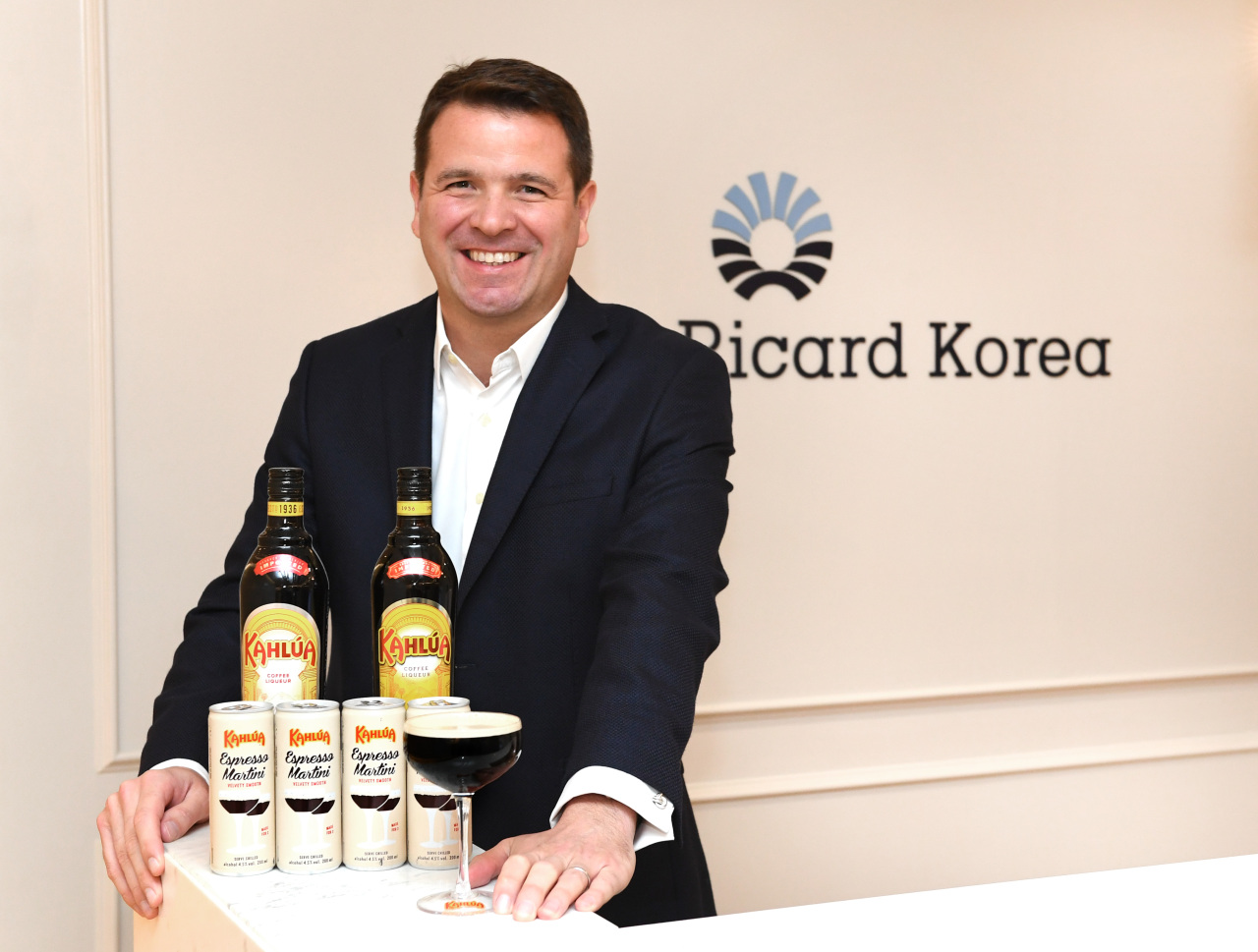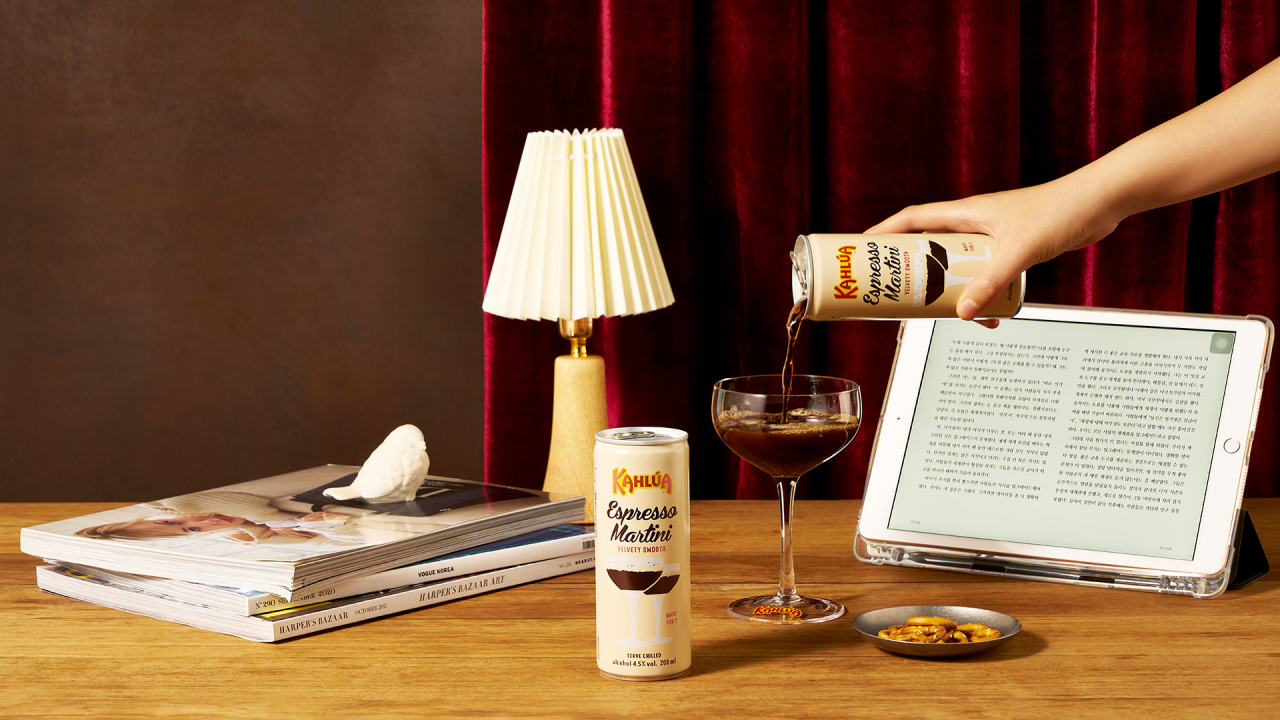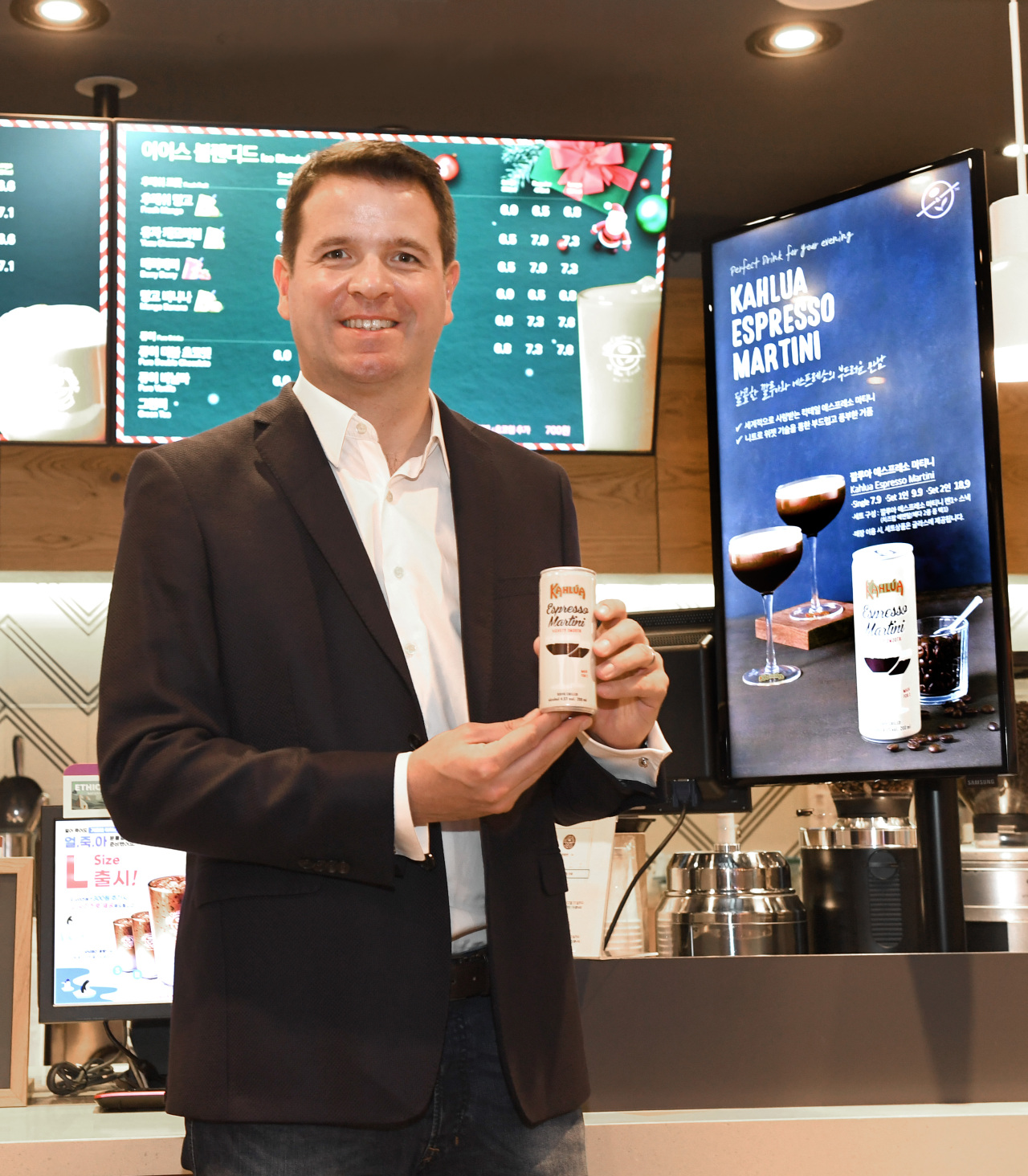 |
Florent Leroi, marketing director at Pernod Ricard Korea (PRK) |
Consumption of alcohol at home has been growing amid the prolonged COVID-19 pandemic. According to Statistics Korea earlier this week, households spent an average 19,651 won ($17.75) a month on alcoholic beverages, the highest figure since the agency began collecting relevant data.
With that, the demand for better convenience in drinking has also surged, further accelerating the growth of ready-to-drink alcoholic beverages since before the pandemic. The ready-to-drink market in the US, for instance, grew 80 percent in 2019 and ended the year with a total value of more than $100 million, according to consumer analytics firm Nielsen.
Seeking to bring the trend to South Korea is Pernod Ricard Korea, which recently unveiled the Kahlua Espresso Martini Can. The beverage is an espresso martini in a can, apparently mindful of Koreans’ infatuation with coffee. The coffee industry in Korea has been a notable bright spot, with the industry analyzing the 7 trillion-won market as growing to 9 trillion won by 2023. Adults on average here consume about 352 cups of coffee a year as of 2018, according to Hyundai Research Institute.
“It is a twist on the classic Kahlua cocktail made with coffee, contained in a can,” PRK’s marketing director Florent Leroi said in an interview with The Korea Herald. Leroi was appointed to his current position after serving in multiple roles at Pernod Ricard since 2000.
“It’s the perfect blend of Kahlua, coffee and vodka, completed with the signature creamy foam reminiscent of a just-made Espresso Martini cocktail,” Leroi said.
First released in a select few countries in 2018, its Korean release comes on the heels of a growing drinking trend in the midst of the pandemic, which saw an uptick in on-the-go spirits-based drinks, the company explained.
The Kahlua Espresso Martini ticks many boxes for trendy drinkers.
To begin with, it has low alcohol by volume -- 4.5 percent for the 200-milliliter can -- reflecting a recent trend for lighter drinking in the country. It’s also a hard seltzer, thanks to the smart “nitrogen widget” that brings bubbles to the surface as soon as the can is opened, creating the classic Espresso Martini velvety foam. It combines Kahlua with an Arabica coffee blend and vodka at the “optimal” ratio to give off a sweet yet deep coffee taste and flavor.
“Kahlua Espresso Martini Can is targeting the consumers who want to have a soft and light beverage in the later afternoon, rather than coffee itself,” Leroi said, explaining that the company conducted a focus group discussion to figure out market demands.
 |
(PRK) |
Though canned alcohol drinks are often found at supermarkets and convenience stores, PRK has teamed up with Coffee Bean & Tea Leaf to exclusively distribute the Kahlua Espresso Martini Can at 42 flagship Coffee Bean locations in Seoul, where it is served in a martini glass.
The marketing decision also came after a focus group discussion where the company found that Kahlua – a coffee liqueur from Mexico – is consumed more at home and outdoors, rather than at bars.
“By distributing Kahlua Espresso Martini Can via a cafe channel exclusively, we’re definitely going to take a much more coffee-leading approach to make sure consumers are aware that Kahlua is made with coffee and not just that it goes well with coffee,” he said.
The launching of the drink in Korea came with a bang earlier this month, rolling out coffee cocktails at nine independent cafes in Seoul as part of the “Coffee Goes Cocktails” campaign.
There are still some hurdles to overcome, however, such as South Koreans’ strong love for soju and beer.
Yet, PRK remains hopeful, as it believes there to be a great opportunity in stores to carve out a specific section for the ready-to-drink category in the Korean market.
“Globalization has accelerated the spread of a trend from one country to another, making a shared similar trend across the world. However, popular products may differ slightly due to the cultural characteristics of each market. In Korea, we know that soju and beer have a thick fan base,” Leroi said.
“We will keep providing a variety of liquor cultures and experiences that consumers can enjoy in addition to soju and beer,” he said.
With the company’s vision being “Createurs de Convivialite” and its goal to encourage people to go out in search of friends old and new, Leroi said that ready-to-drink beverages are among the categories in the alcohol industry that will “not slow down anytime soon.
“They are so convenient, perfect to bring for a responsible socially distanced gathering where people don’t have to worry about bringing glasses with them and cleaning them. Lately we’ve been hearing a lot of on-premise sites leveraging them, by offering ready-to-drink products on delivery or takeaway because these cans are so convenient to serve.”
 |
Florent Leroi, marketing director at Pernod Ricard Korea (PRK) |
PRK eyes expanding its presence in the spirits market by meeting various demands.
“Pernod Ricard Korea will strive to be a fully consumer-centric company, creating new convivial moments not only in the spirits market, but also where consumers’ needs exist -- after a meal or during a meeting, when a companion is weak in alcohol, or when a women drinks alone at cafe,” Leroi said.
By Yim Hyun-su (
hyunsu@heraldcorp.com)










![[Today’s K-pop] Blackpink’s Jennie, Lisa invited to Coachella as solo acts](http://res.heraldm.com/phpwas/restmb_idxmake.php?idx=644&simg=/content/image/2024/11/21/20241121050099_0.jpg)